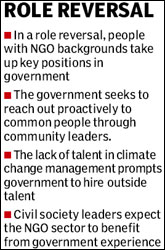While government agencies and non-governmental organisations are adversaries by definition, an increasing number of government-appointed non-governmental leaders to key positions are setting the national agenda in areas like women’s development, gender justice, right to information and energy, and becoming role models for a younger generation.
While Planning Commission member Syeda Hameed, who is also associated with a host of NGOs, is engaged in strengthening the interface between the government and the NGO sector, Ajay Mathur, director-general of the Bureau of Energy Efficiency (BEE), who comes originally from non-governmental and multilateral organisations, is also involved in setting the national agenda to combat global warming as a member of the Prime Ministers Council on Climate Change.
Similarly, additional solicitor-general Indira Jaising, who is also a social action lawyer, is promoting the cause of gender justice, among other issues, and Orissa state information commissioner Jagadananda, who is probably the best known NGO leader from the state, is engaged in promoting the right to information.
 At the Planning Commission, Hameed looks after issues like women and children, health, government-NGO interface and financial allocation in states like Haryana, Himachal Pradesh and Rajasthan. If I did not have exposure to NGOs, how would I be able to input peoples voices into the planning process says Hameed, who is also the founder member of the Muslim Women’s Forum and South Asians for Human Rights, and founder trustee of the Womens Initiative for Peace in South Asia and Centre for Dialogue and Reconciliation. Whether it is for official reasons or personal commitment, she is constantly engaging with the NGO community and even visiting far-flung areas to interact directly with the people.
At the Planning Commission, Hameed looks after issues like women and children, health, government-NGO interface and financial allocation in states like Haryana, Himachal Pradesh and Rajasthan. If I did not have exposure to NGOs, how would I be able to input peoples voices into the planning process says Hameed, who is also the founder member of the Muslim Women’s Forum and South Asians for Human Rights, and founder trustee of the Womens Initiative for Peace in South Asia and Centre for Dialogue and Reconciliation. Whether it is for official reasons or personal commitment, she is constantly engaging with the NGO community and even visiting far-flung areas to interact directly with the people.
On the other hand, BEEs Mathur honed his skills earlier on in the development sector. Mathur led the Climate Change Team at the World Bank and the Energy Technology Division of Teri in New Delhi. Putting his experience to good use at the BEE, he succeeded in turning his energy efficiency standards and labelling programme for appliances into a peoples movement. The initiative pursued a twin-pronged strategy to encourage self-regulation in consumers and lay down market principles to promote energy efficiency. Since the government lacks corpus of knowledge in emerging fields like climate change management, it makes sense to get talent from wherever it is available, including non-governmental organisations. And the trick is to learn by doing, says Mathur.
Jaising, who is the first woman to become additional solicitor-general of India, adds, Its not only an issue of knowledge. There is a general inertia in the government machinery. More knowledgeable people from outside the government should work with it to improve the quality of governance. It would be useful to have a younger generation of people from outside the government working with it.
Jaising is founder secretary of the Lawyers Collective, a public interest litigation service provider, which works in areas like HIV/AIDS discrimination and women’s rights. She has also taken up several cases in areas ranging from sexual harassment, women’s inheritance and guardianship rights to environmental law.
Echoes Orissa’s Jagadananda: The government machinery has a very official approach to work. At times, it does not lead to desired results on forward looking issues. The passionate commitment of NGO leaders is good to energise people in the government and push the envelope. Before joining the Orissa Information Commission, Jagadananda headed CYSD (Centre for Youth and Social Development), which works with rural people and tribals in the state. At the same time, he has also served as chairman of the Voluntary Action Network of India, an association of NGOs in India, and chair of Sa-Dhan, a network of microfinance institutions.
Besides, there is the National advisory Council (NAC), set up by the Prime Minister’s Office (PMO) with a budgetary allocation, to establish an interface with the civil society and advise the government on the implementation of social issues under the common minimum programme. Though criticised by the Opposition for its constitution, the NAC has furthered the cause of the National Rural Employment Guarantee Act (NREGA) and the Right to Information Act.
In addition to chairperson Sonia Gandhi with the rank of a Cabinet minister, it comprises civil society members like Deep Joshi, Farah Naqvi and Mirai Chatterjee. Joshi has set up Pradan to promote rural livelihoods, Chatterjee is from SEWA, and Naqvi co-founded Nirantar, which works on gender and education. Other members include MS Swaminathan, Aruna Roy and Harsh Mander, who began with working for either the academia or the government, crossed over to the NGO sector and are now doubling in advisory roles.
In fact, Jagadananda is even looking forward to taking his government experience back to his NGO after his term ends at the information commission. The marriage of convenience is evidently a win-win situation for both the government and NGOs.
Source: The Financial Express
Published on 16 December 2010
